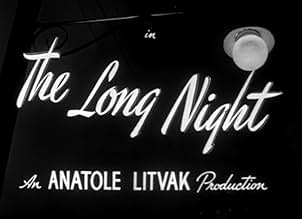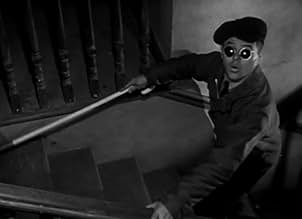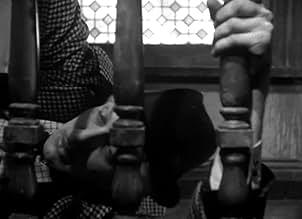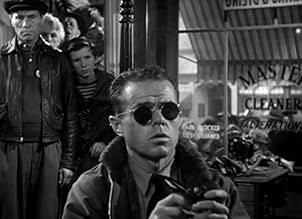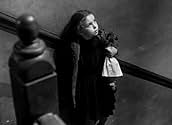AVALIAÇÃO DA IMDb
6,5/10
2,2 mil
SUA AVALIAÇÃO
Adicionar um enredo no seu idiomaPolice surround the apartment of apparent murderer Joe Adams, who refuses to surrender although escape appears impossible. During the siege, Joe reflects on the circumstances that led him to... Ler tudoPolice surround the apartment of apparent murderer Joe Adams, who refuses to surrender although escape appears impossible. During the siege, Joe reflects on the circumstances that led him to this situation.Police surround the apartment of apparent murderer Joe Adams, who refuses to surrender although escape appears impossible. During the siege, Joe reflects on the circumstances that led him to this situation.
- Direção
- Roteiristas
- Artistas
- Prêmios
- 4 vitórias no total
Melinda Byron
- Peggy
- (as Patty King)
Davis Roberts
- Freddie
- (as Robert A. Davis)
Fred Aldrich
- Ticket Taker
- (não creditado)
Murray Alper
- Mac - Bartender
- (não creditado)
Bobby Barber
- Nightclub Patron
- (não creditado)
Vangie Beilby
- Audience Member
- (não creditado)
Brooks Benedict
- Audience Member
- (não creditado)
Gladys Blake
- Millie - Saloon Waitress
- (não creditado)
- Direção
- Roteiristas
- Elenco e equipe completos
- Produção, bilheteria e muito mais no IMDbPro
Avaliações em destaque
10jakob_34
A remake of Marcel Carnes French film Le Jour Se Leve, with excellent performancies, Henry Fonda is very good in the leading role and Vincent Price at his smarmiest. Barbara Bel Geddes makes a very good debut as movie actress. The director Anatole Litvak have done the film with great flair, it has a nice feel to it and is interesting and dramatic. I think this film is very underrated and should receive more attention than it does, Sol Politos camerawork is very interesting and give some scenes a claustrophobic feeling with his use of light and shadow. If you like atmospheric, dramatic noir dramas I can recommend this one.
9tavm
When I went to my local library to check some DVDs, I stumbled onto this obscure flick that starred Henry Fonda, Barbara Bel Geddes (in her film debut), Vincent Price, and Ann Dvorak. With that cast (I just remembered that Elisa Cook, Jr. has a memorable role as a blind man here), with Anatole Litvak as director, and Dimitri Tiomkin conducting his score (as well as some Beethoven pieces spread among it), I expected an excellent suspenseful movie and I got it! Well, maybe nearly so since the speech Ms. Bel Geddes says to Fonda at the end is obviously contrived to address the audience as well as the leading character about the faith of people. Otherwise, the dialogue was mostly spot-on especially the heated exchanges between Fonda and Price who, as usual, is absolutely charming even in his creepiness. And Ms. Dvorak marks a nice contrast with her cynicism as compared with Ms. Bel Geddes' optimism. Fonda himself goes the full range of emotions whether during the flashbacks or his present condition of being holed up in his apartment while the police are waiting outside. So for all that, I highly recommend The Long Night.
I wouldn't say The Long Night is a great film, and if anything it only peaks my interest more to see how much more classic the film it's based on is- Marcel Carne's La Jour se Leve. But for the time it ran, I was mostly glued to the screen, and got wrapped up in the plight of Henry Fonda's character Joe, and his predicament of his downfall from normalcy. It probably isn't very original, taking aside its connection with the French source; it's about a factory worker, very nice guy, who falls in love with a woman whom, he finds out, was an orphan just like him. But one night he follows her to a bar, sees her cavorting sort of with a sleazy magician (Vincent Price), and his perfect image of her is shattered, and grows only darker after he meets him (he first tells Joe he's her father, which is a truly great scene between two huge stars of classic film), and when she tells him about her history with him.
While I could never take my eyes off the screen, it should be said that for all of the strong craftsmanship with the picture (it's one of the finest photographed 'noirs' of the late 40s, especially for those stark scenes of Joe alone in his room with the whole town on the street calling for him) and for all of the tremendous talent in front of the camera- besides Fonda and Price, who the former it's a splendid and rewarding if not best-ever performance and for the latter a triumph of playing sneaky and villainous, the girl playing Jo Ann (Barbara Bel Geddes) is very good- it only works up to a point. I was engrossed the most in the last twenty minutes or so, as the film revved up its pace and tempo to the "will Joe or won't Joe" beat. Before that, it's many scenes that mostly rely on the presence of the actors to uplift the material past the breezy and conventional air of the dialog. There's nothing especially "wrong" with the material, but it doesn't go anywhere aside from hitting its main points.
The Long Night is something of a minor lost marvel- only recently did it come out on DVD in an OK print- and for Fonda and Price fans its a can't-miss kind of picture. Just don't go expecting anything that will change your perception of what film-noirs can go that don't go for the easy routes.
While I could never take my eyes off the screen, it should be said that for all of the strong craftsmanship with the picture (it's one of the finest photographed 'noirs' of the late 40s, especially for those stark scenes of Joe alone in his room with the whole town on the street calling for him) and for all of the tremendous talent in front of the camera- besides Fonda and Price, who the former it's a splendid and rewarding if not best-ever performance and for the latter a triumph of playing sneaky and villainous, the girl playing Jo Ann (Barbara Bel Geddes) is very good- it only works up to a point. I was engrossed the most in the last twenty minutes or so, as the film revved up its pace and tempo to the "will Joe or won't Joe" beat. Before that, it's many scenes that mostly rely on the presence of the actors to uplift the material past the breezy and conventional air of the dialog. There's nothing especially "wrong" with the material, but it doesn't go anywhere aside from hitting its main points.
The Long Night is something of a minor lost marvel- only recently did it come out on DVD in an OK print- and for Fonda and Price fans its a can't-miss kind of picture. Just don't go expecting anything that will change your perception of what film-noirs can go that don't go for the easy routes.
I don't like remakes--and that is why I waited so long to watch "The Long Night". Originally it was a dandy French film ("Le Jour Se Leve") and I saw no reason to redo the film, as the original was quite good. And, after seeing it, I stick by my original opinion--there just wasn't a need to make this remake. However, I can understand why they made it, as folks in the States back in the 1940s did not watch foreign films--and when they saw this American version, it did seem original. But now with DVDs, Turner Classic Movies and Netflix, you should just stick with "Le Jour Se Leve".
The film is a talky picture about a brooding guy (Henry Fonda), his sweetie-pie (Barbara Bel Geddes) and a completely bizarre blabber-mouth (Vincent Price). Fonda and Bel Geddes are in love but Price is determined to break them up--and push Fonda to the breaking point. The story is told through flashbacks and is similar to the Jean Gabin film--without the film noir camera-work and lighting. Also, the American version comes off as much talkier--much. All in all, not a terrible film at all--but not the 9 that the other film deserved when I rated it a couple years ago.
The film is a talky picture about a brooding guy (Henry Fonda), his sweetie-pie (Barbara Bel Geddes) and a completely bizarre blabber-mouth (Vincent Price). Fonda and Bel Geddes are in love but Price is determined to break them up--and push Fonda to the breaking point. The story is told through flashbacks and is similar to the Jean Gabin film--without the film noir camera-work and lighting. Also, the American version comes off as much talkier--much. All in all, not a terrible film at all--but not the 9 that the other film deserved when I rated it a couple years ago.
I've never seen the original French film upon which this film was based, but I can tell you I kept waiting for a plot line payoff that never came. It has everything going for it - solid cast giving good believable performances, good direction, even a good speech that Fonda's character delivers from this broken out window as he is under siege by the police that gives us some insight into what it's like for an average guy who has returned home from years of killing and seeing killing in the war expected to pick up where he left off. But ultimately, I never see anything that Fonda's character, factory laborer Joe Adams, has been put through as far as shock or emotional torment or even disillusionment that would justifiably cause him to kill a man. Is Vincent Price's character Maximillian eloquently taunting and creepy? Yes, and in a way that Price excelled at over the years starting in noirs and proceeding on into his horror films. However, at no time does he do anything that would drive anybody to do more than shoo him away or stuff earplugs in their ears or possibly call the ASPCA (You'll have to watch the film to understand this last remark). I'm giving this film a five just for the fact that I believe the production code is the reason any hard edges that seem to be just under the surface never appear. I'm almost positive the script would have gone further if the censors would have allowed it to be so.
The real point of interest to me was the action of the police, who behave a lot like the fascists that Joe Adams spent years fighting in WWII. Sure they have a murderer holed up in his rented room, but he's holding no hostages, they've emptied the building, and still they spray him twice with automatic gunfire unannounced - once from the outside into his window, then from the stairwell into the door. When he pushes a sturdy dresser against the door and they realize they can't force their way in THEN they try talking to Joe, starting with the line "We're not fooling"?? No kidding! After Fonda's speech to the crowd, once the crowd starts voicing their support for Joe and promising financial help with a lawyer the police form a line and practically trample the crowd forcing them out of the street. I don't know if the heavy handedness of the police was something that Litvak wanted the audience to notice, but it was something I noticed.
I'd recommend this one just for the good performances and atmosphere and some imagery you don't see that much in films immediately after WWII, but don't expect something shocking or even interesting to happen just because of all of the talent assembled here.
The real point of interest to me was the action of the police, who behave a lot like the fascists that Joe Adams spent years fighting in WWII. Sure they have a murderer holed up in his rented room, but he's holding no hostages, they've emptied the building, and still they spray him twice with automatic gunfire unannounced - once from the outside into his window, then from the stairwell into the door. When he pushes a sturdy dresser against the door and they realize they can't force their way in THEN they try talking to Joe, starting with the line "We're not fooling"?? No kidding! After Fonda's speech to the crowd, once the crowd starts voicing their support for Joe and promising financial help with a lawyer the police form a line and practically trample the crowd forcing them out of the street. I don't know if the heavy handedness of the police was something that Litvak wanted the audience to notice, but it was something I noticed.
I'd recommend this one just for the good performances and atmosphere and some imagery you don't see that much in films immediately after WWII, but don't expect something shocking or even interesting to happen just because of all of the talent assembled here.
Você sabia?
- CuriosidadesFilm debut of Barbara Bel Geddes. She was signed to a seven-year contract with RKO after this film. Director Anatole Litvak cast her after seeing her on Broadway as the female lead in "Deep Are the Roots", which played at the Fulton Theatre for 477 performances beginning 26 September 1945.
- Erros de gravaçãoWhen Joe from inside his apartment shoots at the cops who are standing outside his door; it leaves bullet holes in the door. But on a following cut after speaking with the little girl and going back into his apartment; there are no bullet holes on the interior side of the door.
- Citações
Maximilian: [to Jo-Ann] You have sharp nails like a little animal. Maybe that's what I like about you.
- Cenas durante ou pós-créditosOpening card: "...the night is long That never finds the day..." William Shakespeare, Macbeth, Act IV, Scene III
- ConexõesFeatured in Henry Fonda: The Man and His Movies (1982)
Principais escolhas
Faça login para avaliar e ver a lista de recomendações personalizadas
- How long is The Long Night?Fornecido pela Alexa
Detalhes
Bilheteria
- Faturamento bruto nos EUA e Canadá
- US$ 1.000.000
- Tempo de duração1 hora 41 minutos
- Cor
- Proporção
- 1.37 : 1
Contribua para esta página
Sugerir uma alteração ou adicionar conteúdo ausente

Principal brecha
By what name was Noite Eterna (1947) officially released in India in English?
Responda

